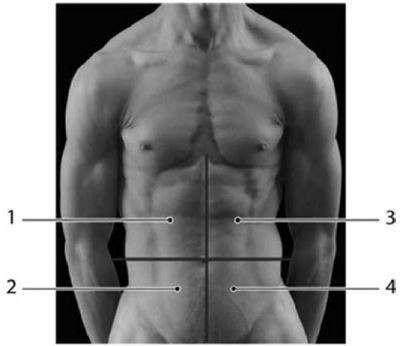Tenderness in which region(s) may be an indication of gallbladder or liver problems?

A) 2
B) 4
C) 1
D) 3 & 4
E) 3
C) 1
You might also like to view...
List the major nerves of the sacral plexus
A) iliohypogastric, ilio-inguinal, and genitofemoral nerves B) lateral femoral cutaneous, femoral, and obturator nerves C) superior and inferior gluteal, posterior femoral cutaneous, sciatic, and pudendal nerves D) tibial, femoral, sural, saphenous, and fibular nerves E) long thoracic, thoracodorsal, saphenous, genitofemoral, and obturator nerves
If using a bulb-style esophageal detector device to assist you in confirming proper ET tube placement, you should expect the bulb to:
A) inflate slowly when you let go of it. B) refill briskly if the tube is in the trachea. C) stay collapsed if the tube is in the trachea. D) expand quickly if the tube is in the esophagus.
Predict the effect of fluid loss through vomiting or diarrhea on juxtaglomerular cell activity
A) Renin would be released. B) Aldosterone levels would fall. C) ADH would be released. D) Renin levels would fall.
What structures does a molecule of oxygen encounter on its way to the alveoli of the lungs from the nose? Trace the pathway
What will be an ideal response?